Fred Magee and the BFD at Wellfleet Library
Wellfleet musician Fred Magee will play a concert of original songs with his newly formed band, the BFD, at the Wellfleet Public Library (55 West Main St.) on Saturday, Jan. 20, at 3 p.m.
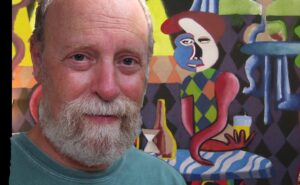
Magee has lived in Wellfleet for 22 years. Since retiring, he says he’s been “following his nose day to day.” He worked full time as a musician until his early 30s, and his nose has led him back to that profession. For the past 10 years, he’s been writing original songs and gigging around the Cape — solo and with other musicians — at libraries, Wellfleet Preservation Hall, the Flying Fish, and various venues in Hyannis.
But he’s never put a band together to play his own music. “A number of the songs I’ve written over the past six or seven years are really band songs,” he says. “They want a drum and bass.” This year, Magee says, he found “three willing partners” in bassist AJ Geoghegan, fiddler Jo Miller, and drummer Peter Tighe. All four musicians will also provide vocals. The newborn band calls itself the BFD — and Magee says that if they play well, he hopes they’ll live up to the acronym.
Magee’s original songs fall loosely into the country, rock, and Americana genres. “A couple songs have a Neil Young feel to them,” he says. “One song is absolutely bluegrass. One is kind of rockabilly.” Most of the songs the band will play at the library have never been performed live.
“We’ll spring ourselves on the world on Saturday and see how it goes,” says Magee. “But I have to say, with each rehearsal, we sound more like a band.”
The concert is free. See wellfleetlibrary.org for information. —Eve Samaha
Strings and Winds Combine in Chamber Concert
The Cape Cod Chamber Orchestra’s second Sandbar Chamber Series begins on Sunday, Jan. 21 at Thacher Hall (266 Main St., Yarmouth Port) with a program including music by Wolfgang Amadeus Mozart, Heitor Villa-Lobos, and Maurice Ravel.
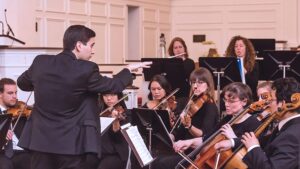
The selections feature disparate musical combinations. In blending strings — including the harp, which is both a stringed and a percussion instrument — and winds, each composer exploits timbral and textural differences, balancing the lush sounds of a string quartet with the more solitary voices of the clarinet and flute and the sparkling quality of the harp.
The program begins with Mozart’s Clarinet Quintet. Composed in 1789, it is a piece in which the musicians seem to play characters in conversation. The clarinet is undoubtedly the soloist who engages with the string quartet as the main character of an opera might engage with the chorus.
It will be followed by Villa-Lobos’s Quintet for Strings, Flute, and Harp, composed in 1957. In dissonant dialogue, the instruments explore a unique sonic landscape — the harp flutters dramatically or strums a syncopated rhythm. The flute and strings often play together, then break away on their own for soloist flourishes and contemplative moments that sound almost improvised. The quintet tells an unmistakably cinematic story.
Last is Ravel’s Introduction and Allegro for Harp, Flute, Clarinet, and String Quartet, composed in 1905 — the biggest ensemble of the program. The piece begins with a spellbinding introduction, then becomes a spirited allegro that maintains Ravel’s characteristic delicacy and hallucinatory impressionistic texture.
Performers include Zach Sheets on flute, Karen Luttik on clarinet, Charles Overton on harp, Jean Huang and Sophia Szokolay on violin, Sam Kelder on viola, and Timothy Paek on cello. General admission tickets are $35, and students and children are admitted free. See capecodchamberorchestra.org for information. —Dorothea Samaha
Two Writers Develop A Cultivated Friendship
Background, disposition, and 34 years separated novelists Edith Wharton and Louis Bromfield. Despite these distances, they developed a close friendship.

Drawing on published correspondence between Wharton and Bromfield, playwrights John Dennis Anderson and Karen Vuranch collaborated on A Cultivated Friendship, which will be presented in a staged reading at Truro Public Library (7 Standish Way, North Truro)
on Saturday, Jan. 20 at 2 p.m. as part of the Truro Playwright Collective series.
The play, which evolved from a Zoom reading commissioned by the Ashland Chautauqua historical performance festival in Ohio in 2021, begins and ends with Bromfield writing about Wharton after her death in 1937. The heart of the play is a mixture of excerpts from their letters and imagined in-person interactions in and around Paris, where they both lived.
Wharton, who came from a wealthy New York family and kept to a small, tight-knit circle of creative friends, wrote more than 40 books over four decades, including The Age of Innocence (1920), for which she became the first woman to win the Pulitzer Prize for fiction. Bromfield, who grew up in small-town Ohio, wrote the Pulitzer Prize-winning Early Autumn (1926) and later developed a career as a screenwriter and agricultural reformer. Unlike Wharton, he was known for extroversion: at brunch every Sunday at his home near Paris, movie stars and politicians would mingle in the garden with Indian royalty and American expatriate literati, says Anderson.
“It was clear that there were scenes in between these letters that got me imagining what Wharton and Bromfield were like face to face,” he says. “Karen and I played with the idea that they might have considered collaborating on a story inspired by the Lindbergh baby kidnapping, and that Agatha Christie scooped them.” (Christie’s classic 1934 mystery Murder on the Orient Express was inspired by that 1932 kidnapping and murder.)
When Wharton’s publishing career started to wane in the 1930s, Bromfield gave her advice on how to appeal to new magazine markets and find a literary agent. Anderson says they also connected over their shared love of gardening and animals. Rikki-Tikki-Tavi, a pet mongoose that Bromfield procured during his travels in India, made frequent appearances in the letters.
Anderson, who lives in Wellfleet, has performed as Bromfield. For the staged reading at the Truro library, however, he is looking forward to sitting in the audience and watching actors Jarice Hanson and Dustin Ross perform as Wharton and Bromfield, respectively.
The event is free. See trurolibrary.org for more information. —Aden Choate
Walter Dorrell’s Reimagined Landscapes
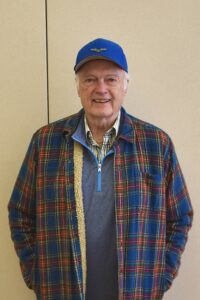
“This is the first time I haven’t worked directly from nature,” says painter Walter Dorrell about Landscapes Reimagined, his show of new paintings currently on view at the Wellfleet Adult Community Center. “I wanted to see if I could transition from the real to the remembered.”
The show, which is organized and curated by artist and collector Robert Rindler, features abstract paintings in which landscape is reduced to just its colors.
Dorrell, 91, started painting 50 years ago and moved to the Outer Cape in 1977. “I had many years on the water painting on the landscape,” he says. “I started seeing things in the water and it’s reflected here as well.”
Most of Dorrell’s work has involved plein air painting with watercolors. He would rise early and hop in his canoe.
“I’d go out and float and paint,” he says. “You talk about ecstasy — watching that sun come up!” He describes the scene depicted in a painting called Abstract #13. “This is more of a foggy ocean view in Maine,” he says. “The sun is being filtered by the fog, beach, and rocks.”
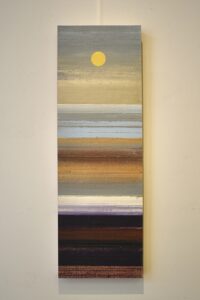
While Dorrell often works on still lifes in his studio over the winter, the current exhibition includes only abstract variations of the genre. Abstract #17 features a cluster of oyster shells. Here, the artist has split the vertical picture plane into thirds. In the top third are stripes of white, canary yellow, sky blue, and burnt sienna. The central third depicts a still life of crowded oyster shells displayed on a small square glass plate against a cobalt blue background. For the bottom section, Dorrell used a sharp stick to draw the outlines of more abstracted oyster shapes in a field of gold paint.
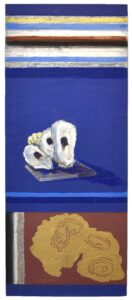
Although most of the works in the exhibition are abstract, three of the paintings are more impressionistic. “I started over here with the realistic and then turned abstract,” he says of one of them. “I thought the viewer would not get it, so I wanted to put an object in. I wanted the moon to give the painting position in time and space.”
Dorrell says the paintings are explorations in which he tries to convey the excitement he feels when painting them. He’s enjoying his new direction. “I got on a kick,” he says. “The dark indigo, the cobalt — I thought well, it looks like the ocean. It’s a way of looking into the future, I suppose, hoping things will turn out OK.”
The exhibition is on view through the end of January. See wellfleetcoa.org for information. —Pat Kearns



